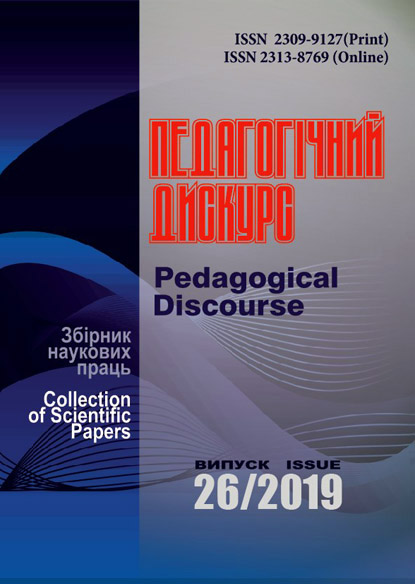Formedness of Informational-Cognitive Component of Health Culture of the Future Teachers of Physical Culture and the Ways of its Improvement
Abstract
During the professional training of the future teachers of physical culture in higher education institutions it is necessary to form an appropriate level of health culture. It will give a possibility for the future teachers to competently carry out their professional activities, be an example for the pursuit of health. We consider components as the most significant parts of the culture of health, which fully reflect its content and characterize its features. The health culture is considered through the unity and interrelation between the motivational-value, informative-cognitive, organizational-activity, personal-emotional and reflexive-evaluation components. The article presents a thorough description of the informational-cognitive component of the health culture of the future teachers of physical culture. The results of monitoring on the formation of indicators (completeness of knowledge about the culture of health and the level of general outlook) of this component at the research stage have been described. The completeness of knowledge about the culture of health has been tested on the basis of two methods –comprehensive survey and methodology «Unfinished sentences». Written work allowed covering all areas of activity of the future teachers of physical culture. The object of evaluation was a set of acquired knowledge, a formed system of professional competencies. Monitoring has shown that the health culture of students is spontaneous, and therefore only one fifth of respondents has a high (creative) level, while 2/3 of respondents have an average (basic) level.
The main focus is on highlighting practical mechanisms for improving the informational-cognitive component of health culture through interdisciplinary integration of knowledge. It is advisable to carry out the rapprochement of related disciplines, due to their convergence. We should implement the integration of compulsory examination and postgraduate disciplines in the bachelor’s degree and the subjects of professional and practical training in the undergraduate and magistracy. Based on the principles of interdisciplinary integration, it is advisable to coordinate the curricula of teaching disciplines in order to avoid repetitions, as well as to substantially improve the methodological support.
Downloads
References
Новий тлумачний словник української мови (Т. 1–3). (2008). Київ: Аконіт / Novyi tlumachnyi slovnyk ukrainskoi movy (Vols. 1–3). (2008). [New Explanatory Dictionary of the Ukrainian Language]. Kyiv: Akonit. [in Ukrainian].
Мосейчук, Ю. Ю. (2018). Теоретико-методологічні основи формування культури здоров’я у майбутніх учителів фізичної культури [моногр.]. Чернівці: «Місто». / Moseichuk, Yu. Yu. (2018). Teoretyko-metodolohichni osnovy formuvannia kultury zdorovia u maibutnikh uchyteliv fizychnoi kultury [The Theoretical and Methodological Bases of the Formation of the Health Culture of Future Teachers of Physical Culture]. [monograph]. Chernivtsi: «Misto». [in Ukrainian].
Завальнюк, О. Л. (2007). Формування ціннісної моделі здоров’я у студентів – майбутніх педагогів. Науковий вісник Чернівецького університету (Вип. 327, c. 59–64.). Чернівці: Рута. / Zavalniuk, O. L. (2007). Formuvannia tsinnisnoi modeli zdorovia u studentiv – maibutnikh pedahohiv [Formation of Valuable Health Model for Students – Future Teachers]. Scientific herald of Chernivtsi University (Vol. 327, pp. 59–64). Chernivtsi: Ruta. [in Ukrainian].
Лобода, В. (2016). Педагогічні умови формування культури здоров’я студентів на заняттях з фізичного виховання. Проблеми підготовки сучасного вчителя (Вип. 13, c. 28–33). Умань: ФОП Жовтий О. О. / Loboda, V. (2016). Pedahohichni umovy formuvannia kultury zdorovia studentiv na zaniattiakh z fizychnoho vykhovannia [Pedagogical Conditions for the Formation of the Health Culture of Students in Physical Education Classes]. Problems of Training a Modern Teacher (Vol. 13, pp. 28–33). Uman: FOP Zhovtyi O. O. [in Ukrainian].
Козігон, В. (2012). Формування культури здоров’я вчителя. Директор школи. Шкільний світ, 21, 37–50. / Kozihon, V. (2012) Formuvannia kultury zdorovia vchytelia [Formation of a Teacher's Health Culture]. School Director. School World, 21, 37–50. [in Ukrainian].
Кочерга, Є. В. (2016). Критерії та показники сформованості здоров’язбережувальної компетентності майбутнього вчителя хімії. Вісник Луганського національного університету імені Тараса Шевченка, 6 (303), ІІ, 15–25. / Kocherha, Ye. V. (2016) Kryterii ta pokaznyky sformovanosti zdoroviazberezhuvalnoi kompetentnosti maibutnoho vchytelia khimii [Criteria and Indicators of the Formation of Health Preserving Competence of the Future Teacher of Chemistry]. Herald of Taras Shevchenko National University of Lugansk, 6 (303), II, 15–25. [in Ukrainian].
Ахвердова, О. А., & Магин, В. А. (2002). К исследованию феномена «культура здоровья» в области профессионального физкультурного образования. Теория и практика физической культуры, 2, 5–7. / Ahverdova, O. A., & Magin, V. A. (2002). K issledovaniyu fenomena «kul'tura zdorov'ya» v oblasti professional'nogo fizkul'turnogo obrazovaniya [To Study the Phenomenon of «Health Culture» in the Field of Professional Physical Education]. Theory and Practice of Physical Culture, 2, 5–7. [in Russian].
Ярощук, Л. Г. (2016). Моніторингові дослідження в Європі як сучасний метод діагностики знань. Оновлення змісту, форм та методів навчання і виховання в закладах освіти, 13 (56), І, 14–19. / Yaroshchuk, L. H. (2016). Monitorynhovi doslidzhennia v Yevropi yak suchasnyi metod diahnostyky znan [Monitoring Research in Europe as a Modern Method of Diagnosing Knowledge]. Updating the Content, Forms and Methods of Education and Training in Educational Institutions, 13 (56), I, 14–19. [in Ukrainian].
Сулима, А., & Кравчук, Т. (2010). Особливості формування культури здоров’я студентів факультету фізичної культури, що займаються єдиноборствами. Теорія та методика фізичного виховання, 11, 43–46. / Sulyma, A., & Kravchuk, T. (2010). Osoblyvosti formuvannia kultury zdorovia studentiv fakultetu fizychnoi kultury, shcho zaimaiutsia yedynoborstvamy [Features of the Formation of the Health Culture of Students of the Faculty of Physical Culture, Engaged in Martial Arts]. Theory and Methods of Physical Education, 11, 43–46. [in Ukrainian].
Узянбаева, Р. Г. (2007). Комплексный подход к формированию культуры здоровья студентов. Теория и практика физической культуры. 5, 49–51. / Uzyanbaeva, R. G. (2007). Kompleksnyj podhod k formirovaniyu kul'tury zdorov'ya studentov [A Comprehensive Approach to the Formation of Student's Health Culture]. Theory and Practice of Physical Culture, 5, 49–51. [in Russian].
Copyright (c) 2019 Pedagogical Discourse

This work is licensed under a Creative Commons Attribution-NonCommercial-ShareAlike 4.0 International License.

















